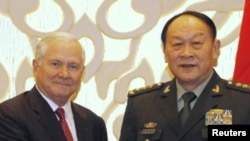At the Shangri-La Dialogue, a security forum in Singapore attended earlier this month by defense ministers and military chiefs of 28 Asia-Pacific nations, U.S. Secretary of Defense Robert Gates, in his last address to the forum in his official capacity, spoke of his nearly 40 years of personal involvement with Asia, and "the enduring and consistent nature of America’s commitments in Asia."
"Irrespective of the tough times the U.S. faces today, or the tough budget choices we confront in the years to come, America’s interests as a Pacific nation ... will endure," Secretary Gates said. "The United States and Asia will only become more inextricably linked over the course of this Century ... These realities and this understanding – shared by U.S. leaders and policy makers across the political spectrum – argue strongly for sustaining our commitments to allies while maintaining a robust military engagement and deterrence posture across the Pacific Rim."
Secretary Gates pointed out that America's engagement in Asia has been guided by a set of principles that have fostered the economic growth and stability of the entire Asia-Pacific region: first, free and open commerce; second, a just international order that emphasizes rights and responsibilities of nations and fidelity to the rule of law; third, open access by all to the sea, air, space, and now, cyberspace; and fourth, the principle of resolving conflict without the use of force.
Upholding principles and providing for security in the Asia-Pacific region is not the task of any one nation alone, but the shared responsibility of all nations. "Experience consistently shows that pursuing our common interests together increases our common security," Secretary Gates said. "This is the one reason we have placed a premium on building the partner capacity of friends in the region and enhancing the role of multilateral cooperation and organizations in Asia-Pacific security affairs."
The commitment and presence of the United States in Asia has been one of the few constants amidst the furious changes in this region in the last 50 years. "It has been enormously gratifying through the course of my career to see the profound good that has come about from American engagement in Asia," Secretary Gates concluded. "As I leave the United States government, I have no doubt that future generations will have a similar story to tell about the benefits of American power, presence and commitment in this region."
America's Commitments In Asia

"Irrespective of the tough times the U.S. faces today, or the tough budget choices we confront in the years to come, America’s interests as a Pacific nation ... will endure."



